Top Rankings
Shelby County School District ranks among the top 20% of public school district in Alabama for:
Category
Attribute
Overall Rank
Highest overall rank (Top 20%)
Math Proficiency
Highest math proficiency (Top 20%)
Reading/Language Arts Proficiency
Highest reading/language arts proficiency (Top 20%)
Science Proficiency
Highest science proficiency (Top 20%)
Graduation Rate
Highest graduation rate (Top 20%)
Community Size
Largest student body (number of students) (Top 1%)
For the 2025 school year, there are 8 public preschools serving 3,064 students in Shelby County School District. This district's average pre testing ranking is 9/10, which is in the top 20% of public pre schools in Alabama.
Public Preschools in Shelby County School District have an average math proficiency score of 52% (versus the Alabama public pre school average of 31%), and reading proficiency score of 67% (versus the 49% statewide average).
Minority enrollment is 27% of the student body (majority Black), which is less than the Alabama public preschool average of 48% (majority Black).
Overview
This School District
This State (AL)
# Schools
33 Schools
648 Schools
# Students
20,937 Students
310,670 Students
# Teachers
1,216 Teachers
18,546 Teachers
Student : Teacher Ratio
17:1
17:1
District Rank
Shelby County School District, which is ranked within the top 20% of all 145 school districts in Alabama (based off of combined math and reading proficiency testing data) for the 2021-2022 school year.
The school district's graduation rate of 95% has increased from 94% over five school years.
Overall District Rank
#17 out of 145 school districts
(Top 20%)
(Top 20%)
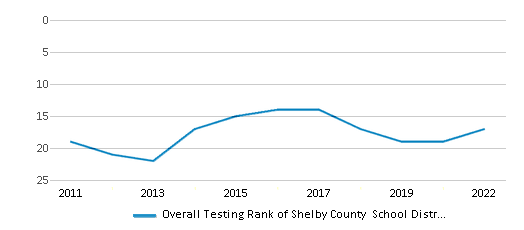
Math Test Scores (% Proficient)
38%
29%
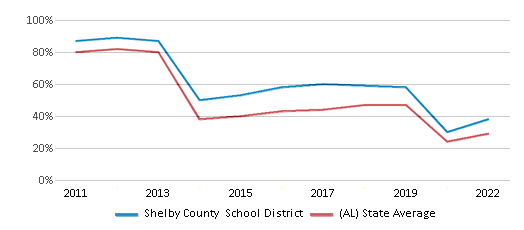
Reading/Language Arts Test Scores (% Proficient)
60%
47%
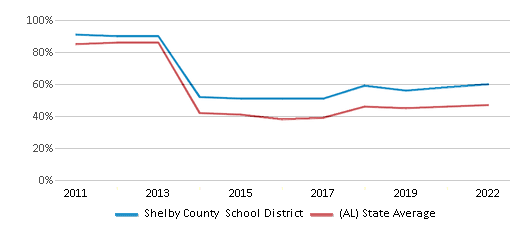
Science Test Scores (% Proficient)
48%
38%
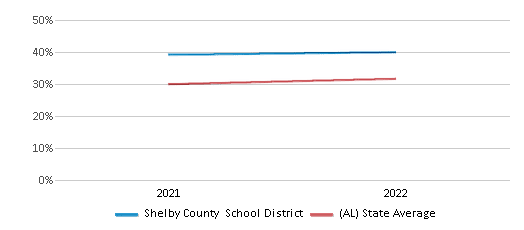
Graduation Rate
95%
88%
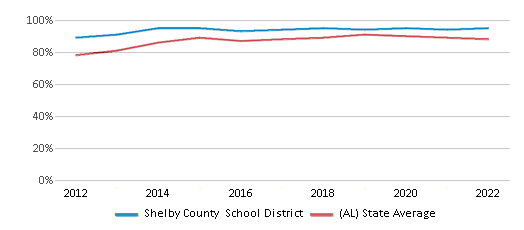
Students by Ethnicity:
Diversity Score
0.52
0.63
# American Indian Students
63 Students
3,275 Students
% American Indian Students
1%
1%
# Asian Students
432 Students
3,474 Students
% Asian Students
2%
1%
# Hispanic Students
2,340 Students
33,026 Students
% Hispanic Students
11%
11%
# Black Students
3,794 Students
93,822 Students
% Black Students
18%
30%
# White Students
13,797 Students
162,634 Students
% White Students
66%
52%
# Hawaiian Students
31 Students
315 Students
% Hawaiian Students
n/a
n/a
# Two or more races Students
480 Students
14,124 Students
% of Two or more races Students
2%
5%
Students by Grade:
# Students in PK Grade:
139
21,304
# Students in K Grade:
1,427
49,720
# Students in 1st Grade:
1,482
50,373
# Students in 2nd Grade:
1,642
48,594
# Students in 3rd Grade:
1,533
40,410
# Students in 4th Grade:
1,609
36,751
# Students in 5th Grade:
1,543
31,378
# Students in 6th Grade:
1,592
12,553
# Students in 7th Grade:
1,595
4,421
# Students in 8th Grade:
1,563
4,401
# Students in 9th Grade:
1,763
2,950
# Students in 10th Grade:
1,766
2,768
# Students in 11th Grade:
1,657
2,555
# Students in 12th Grade:
1,626
2,492
# Ungraded Students:
-
-
District Revenue and Spending
The revenue/student of $12,429 in this school district is less than the state median of $13,006. The school district revenue/student has stayed relatively flat over four school years.
The school district's spending/student of $11,473 is less than the state median of $12,220. The school district spending/student has stayed relatively flat over four school years.
Total Revenue
$260 MM
$9,671 MM
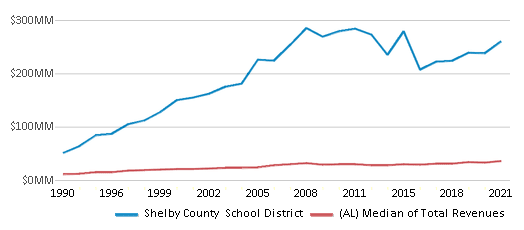
Spending
$240 MM
$9,086 MM
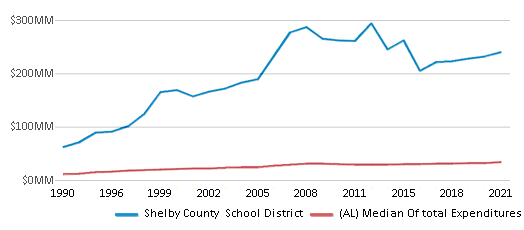
Revenue / Student
$12,429
$13,006
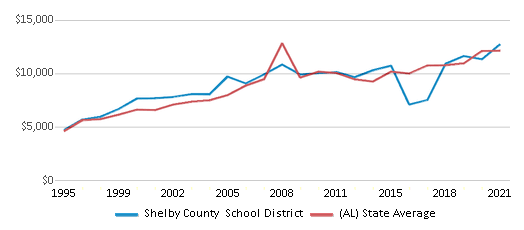
Spending / Student
$11,473
$12,220
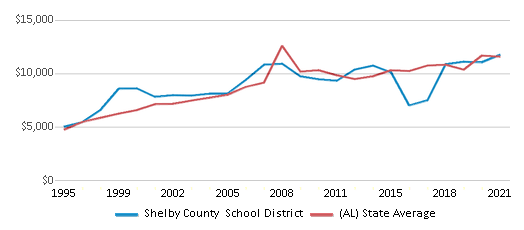
Best Shelby County School District Public Preschools (2025)
School
(Math and Reading Proficiency)
(Math and Reading Proficiency)
Location
Grades
Students
Rank: #11.
Oak Mountain Elementary School
(Math: 70-74% | Reading: 75-79%)
Rank:
Rank:
10/
Top 5%10
5640 Cahaba Valley Rd
Birmingham, AL 35242
(205) 682-5230
Birmingham, AL 35242
(205) 682-5230
Grades: PK-3
| 689 students
Rank: #22.
Inverness Elementary School
(Math: 60-64% | Reading: 75-79%)
Rank:
Rank:
10/
Top 5%10
5251 Valleydale Rd
Birmingham, AL 35242
(205) 682-5240
Birmingham, AL 35242
(205) 682-5240
Grades: PK-3
| 563 students
Rank: #33.
Chelsea Park Elementary School
(Math: 52% | Reading: 71%)
Rank:
Rank:
10/
Top 10%10
9000 Chelsea Park Trail
Chelsea, AL 35043
(205) 682-6700
Chelsea, AL 35043
(205) 682-6700
Grades: PK-5
| 890 students
Rank: #44.
Wilsonville Elementary School
(Math: 45-49% | Reading: 65-69%)
Rank:
Rank:
9/
Top 20%10
71 School St
Wilsonville, AL 35186
(205) 682-6640
Wilsonville, AL 35186
(205) 682-6640
Grades: PK-5
| 231 students
Rank: #55.
Shelby Elementary School
(Math: 50-54% | Reading: 60-64%)
Rank:
Rank:
9/
Top 20%10
19099 Highway 145
Shelby, AL 35143
(205) 682-6630
Shelby, AL 35143
(205) 682-6630
Grades: PK-5
| 239 students
Rank: #66.
Vincent Elementary School
(Math: 30-34% | Reading: 50-54%)
Rank:
Rank:
7/
Top 50%10
40800 Highway 25
Vincent, AL 35178
(205) 682-7320
Vincent, AL 35178
(205) 682-7320
Grades: PK-5
| 381 students
Rank: #77.
Linda Nolen Learning Center
Special Education School
(Math: ≤20% | Reading: ≤20%)
Rank:
Rank:
3/
Bottom 50%10
2280 Highwy 35
Pelham, AL 35124
(205) 682-5800
Pelham, AL 35124
(205) 682-5800
Grades: PK-12
| 71 students
Rank: n/an/a
Star Program Elementary School
Alternative School
2280 Highway 35
Pelham, AL 35124
(205) 682-5800
Pelham, AL 35124
(205) 682-5800
Grades: PK-5
| n/a students
Recent Articles

Sexual Harassment at Age 6: The Tale of a First Grade Suspension
A six-year old in Aurora, Colorado, was suspended after singing an LMFAO song to a little girl in his class and reportedly “shaking his booty.” We look at the case and the sexual harassment problem in public schools today.

How Scaffolding Could Change the Way Your Child Learns
This article explores the concept of instructional scaffolding, a teaching method that enhances learning by breaking down complex tasks into manageable parts. It highlights how scaffolding supports students in developing critical thinking skills and becoming more independent learners. The article discusses the benefits of scaffolding, including improved engagement and reduced anxiety, and provides strategies for its implementation across various educational levels.

February 05, 2025
Understanding the U.S. Department of Education: Structure, Impact, and EvolutionWe explore how the Department of Education shapes American education, from its cabinet-level leadership to its impact on millions of students, written for general audiences seeking clarity on this vital institution.





